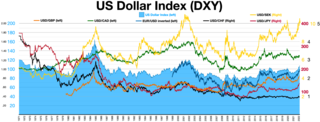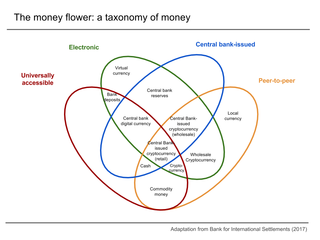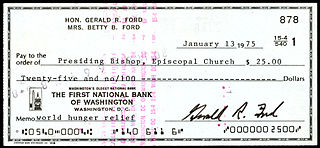Money transfer generally refers to one of the following cashless modes of payment or payment systems:
A currency is a standardization of money in any form, in use or circulation as a medium of exchange, for example banknotes and coins. A more general definition is that a currency is a system of money in common use within a specific environment over time, especially for people in a nation state. Under this definition, the British Pound Sterling (£), euros (€), Japanese yen (¥), and U.S. dollars (US$) are examples of (government-issued) fiat currencies. Currencies may act as stores of value and be traded between nations in foreign exchange markets, which determine the relative values of the different currencies. Currencies in this sense are either chosen by users or decreed by governments, and each type has limited boundaries of acceptance; i.e., legal tender laws may require a particular unit of account for payments to government agencies.
Hawala or hewala, also known as havaleh in Persian, and xawala or xawilaad in Somali, is a popular and informal value transfer system based on the performance and honour of a huge network of money brokers. They operate outside of, or parallel to, traditional banking, financial channels and remittance systems. The system requires a minimum of two hawaladars that take care of the "transaction" without the movement of cash or telegraphic transfer. While hawaladars are spread throughout the world, they are primarily located in the Middle East, North Africa, the Horn of Africa and the Indian subcontinent. Hawala follows Islamic traditions but its use is not limited to Muslims.

A government bond or sovereign bond is a form of bond issued by a government to support public spending. It generally includes a commitment to pay periodic interest, called coupon payments, and to repay the face value on the maturity date.

In finance, an exchange rate is the rate at which one currency will be exchanged for another currency. Currencies are most commonly national currencies, but may be sub-national as in the case of Hong Kong or supra-national as in the case of the euro.

A money order is a directive to pay a pre-specified amount of money from prepaid funds, making it a more trusted method of payment than a cheque.
An informal value transfer system (IVTS) is any system, mechanism, or network of people that receives money for the purpose of making the funds or an equivalent value payable to a third party in another geographic location, whether or not in the same form. Informal value transfers generally take place outside of the conventional banking system through non-bank financial institution or other business entities whose primary business activity may not be the transmission of money. The IVTS transactions occasionally interconnect with formal banking systems, such as through the use of bank accounts held by the IVTS operator.

The foreign exchange market is a global decentralized or over-the-counter (OTC) market for the trading of currencies. This market determines foreign exchange rates for every currency. It includes all aspects of buying, selling and exchanging currencies at current or determined prices. In terms of trading volume, it is by far the largest market in the world, followed by the credit market.
Wire transfer, bank transfer, or credit transfer, is a method of electronic funds transfer from one person or entity to another. A wire transfer can be made from one bank account to another bank account, or through a transfer of cash at a cash office.
A giro transfer, often shortened to giro, is a payment transfer from one bank account to another bank account and initiated by the payer, not the payee. The debit card has a similar model. Giros are primarily used in Europe; although electronic payment systems exist in the United States, it is not possible to perform third-party transfers with them. In the European Union, there is the Single Euro Payments Area (SEPA), which allows electronic giro or debit card payments in euros to be executed to any euro bank account in the area.
Foreign exchange reserves are cash and other reserve assets such as gold held by a central bank or other monetary authority that are primarily available to balance payments of the country, influence the foreign exchange rate of its currency, and to maintain confidence in financial markets. Reserves are held in one or more reserve currencies, nowadays mostly the United States dollar and to a lesser extent the euro.

Digital currency is any currency, money, or money-like asset that is primarily managed, stored or exchanged on digital computer systems, especially over the internet. Types of digital currencies include cryptocurrency, virtual currency and central bank digital currency. Digital currency may be recorded on a distributed database on the internet, a centralized electronic computer database owned by a company or bank, within digital files or even on a stored-value card.

A cheque, or check, is a document that orders a bank to pay a specific amount of money from a person's account to the person in whose name the cheque has been issued. The person writing the cheque, known as the drawer, has a transaction banking account where the money is held. The drawer writes various details including the monetary amount, date, and a payee on the cheque, and signs it, ordering their bank, known as the drawee, to pay the amount of money stated to the payee.
Nostro and vostro are accounting terms used to distinguish an account held for another entity from an account another entity holds. The entities in question are usually banks.
A payment system is any system used to settle financial transactions through the transfer of monetary value. This includes the institutions, instruments, people, rules, procedures, standards, and technologies that make its exchange possible. A common type of payment system, called an operational network, links bank accounts and provides for monetary exchange using bank deposits. Some payment systems also include credit mechanisms, which are essentially a different aspect of payment.
A correspondent account is an account established by a banking institution to receive deposits from, make payments on behalf of, or handle other financial transactions for another financial institution. Correspondent accounts are established through bilateral agreements between the two banks.
China's banking sector had ¥319.7 trillion RMB in assets at the end of 2020. The "big four/five" state-owned commercial banks are the Bank of China, the China Construction Bank, the Industrial and Commercial Bank of China, and the Agricultural Bank of China, all of which are among the largest banks in the world as of 2018. The Bank of Communications is sometimes included. Other notable big and also the largest banks in the world are China Merchants Bank and Ping An Bank.
The history of banking in China includes the business of dealing with money and credit transactions in China.

In monetary economics, the currency in circulation in a country is the value of currency or cash that has ever been issued by the country’s monetary authority less the amount that has been removed. More broadly, money in circulation is the total money supply of a country, which can be defined in various ways, but always includes currency and also some types of bank deposits, such as deposits at call.
A fixed exchange rate, often called a pegged exchange rate, is a type of exchange rate regime in which a currency's value is fixed or pegged by a monetary authority against the value of another currency, a basket of other currencies, or another measure of value, such as gold.
KlickEx is a Polynesian Central Bank Money payments system for domestic, high value, low value, securities, cheque, and electronic foreign exchange transactions using an interbank smart market retail system. It provides exchange clearing service platforms to central bank, commercial bank, nonbank, and non-financial clients in the Pacific Islands, also providing a guaranteed fund, net settlement, retail servicing to mobile money operations across the region, avoiding the usual foreign transfer delays, fees and spreads by matching up individuals or central-bank-settling payments to and from the islands.